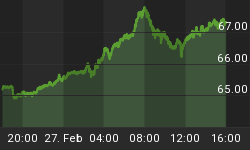If they don't want their own stock, why should you? I am referring, of course, to insiders of the largest publicly traded companies in America. Top executives are allowed to buy their own company's stock as long as they hold the stock for at least six months. I would imagine that at any major stock market low, there will be hundreds of insiders literally loading the boat with their own company's stock. The lows of October 2002 and last month show virtually zero buying, and this is an across the board phenomena.
According to Thomson Financial, most of the big-cap stocks in America have seen close to zero buying in the last 12 months, and most of these stocks show moderate to heavy insider selling. The same results stand whether you look at technology, retail or industrial. It doesn't matter if the companies participate heavily in options compensation or not. The facts are here; the conclusion must be the top executives in corporate America do not want to own their own stocks. Why do you own them?
In the technology field, insiders receive a large portion of their compensation in the form of options. The way they realize this compensation is to sell the stock these options represent. As expected, there is more selling in technology companies than other industries. But a pattern has emerged here that is disturbing. The companies showing the highest amount of selling are the ones that have moved up recently. Yahoo shows a total of $55 million of sales in the last 12 months and no buying. $30 million of those sales came in the last month. Dell has moved up from $23 in February to about $30 today. In the last five weeks, Michael Dell has sold $400 million of his own stock. We are talking about people who live paycheck to paycheck here. If they think there is more upside in the near future, they will wait to sell their stock. But they are unloading as the stocks rally to new highs. You're buying, they're selling. Are you comfortable with that?
The greatest thing about the stock market is that human emotions are the ultimate driving force behind any move. It doesn't matter what laws or preconditions exist, if insiders think stocks are cheap and they can make a lot of money owning shares, they will find a way to buy stock by the truckload. If they think stocks are over-valued, their own fears will cause them to cash out. Last month, Ford dropped to an 11 year low. Before I looked up the insider activity, I expected to see a lot of buying. The stock has been crushed, and the company isn't going out of business, right? Old Billy Ford himself was the only executive to buy any shares, and he plunked down a whopping $30 grand. The guy probably spends $30,000 a month landscaping the grounds of his estates, and that's all he thought his stock was worth? Pathetic.
Insider activity is not a short-term timing tool. But the experts are making me deaf again with their screams of the bottom in March. It was not the bottom. The "real" experts are telling us that.















